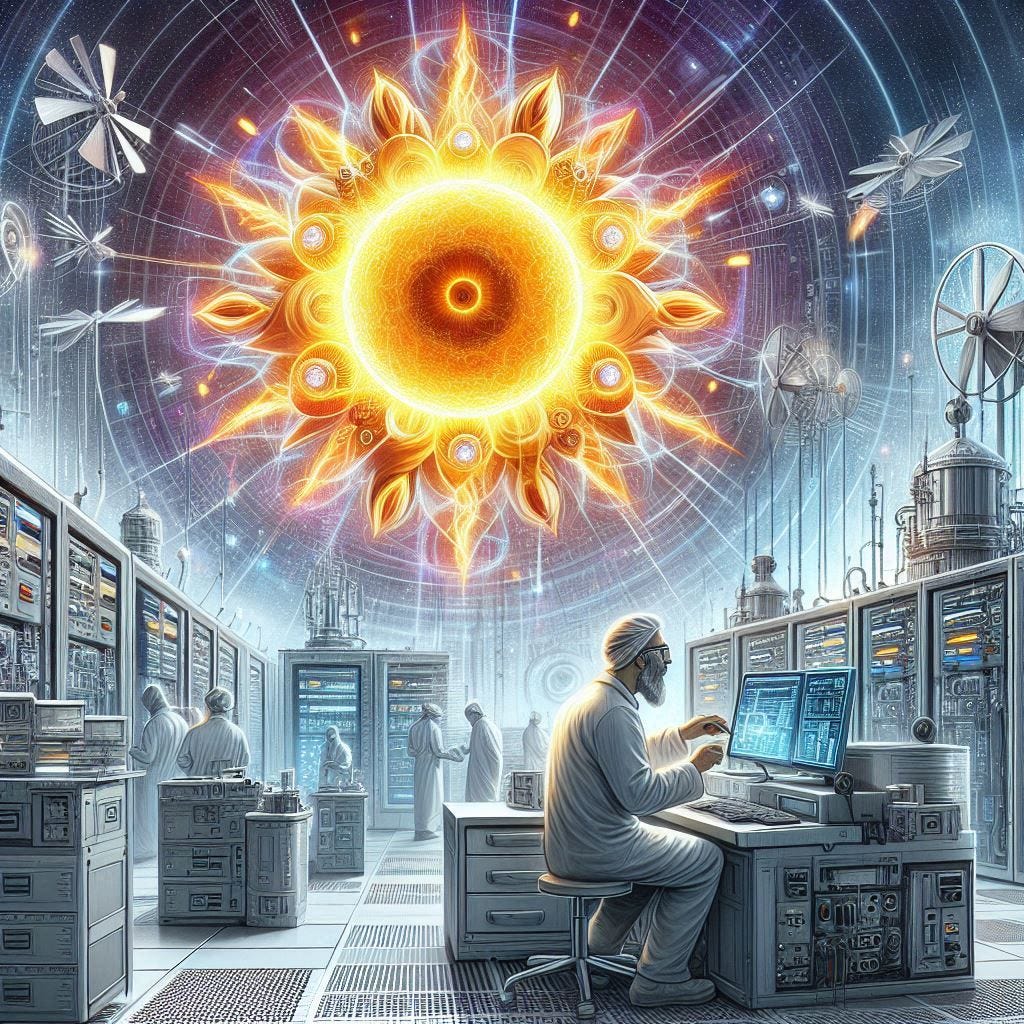The Data Janitor
JD walked down the narrow pathway with his mop, ensuring that the tracked-in mud was as clean as the rest of the facility. The air around him in this server farm hummed quietly, putting him in a meditative mood. The blue LEDs which occasionally flickered illuminated the cavernous space.
This place was the epicenter of the future, and he was in charge of its cleanliness. It was a job he took seriously.
He exited the hallway and passed by a room with a DANGER sign painted over it. This was the heart of the whole data center: a miniature sun pulsated below that room’s floor, sending clean abundant fusion energy to power the facility’s many computers.
As he passed, there was a sudden loud noise from inside. Before he had the chance to turn back, red strobes suddenly bathed the atrium in an ominous glow. Klaxons began roaring.
“Primary containment field collapsing,” said the facility’s synthetic voice, laced with static. “Evacuation protocol must go into effect.”
JD felt a worry in the pit of his stomach. While he could get out safely, what would happen to ADA, the Artificial Data Authority? This was the ever-vigilant AI which was meant to control the reactor. It was the brains of this place — all he could do was the grunt work that required a body: replacing filters, splicing cables.
Now a meltdown was imminent and without ADA’s guidance there was no way to stop it.
He felt a sense of duty and returned to the electrical room. Since his job required it, he was able to swipe his badge and step inside. There was a long staircase surrounding the perimeter of the room. At the bottom he saw a glowing ball of white, which was incredibly bright but also flickering too much.
He sprinted down to the control console, which was separated from this reaction by a bubble of reinforced glass. He saw a sharp tear in the shimmering containment field.
“ADA, what’s the containment protocol?” he barked into his radio.
Static. Just static.
He grew panicked. As the reaction grew more volatile, the power output became too low for ADA to run.
Thinking fast, JD grabbed the keyboard and began pecking away at the manual linked inside the emergency terminal. He thousands of code files, none of which he could decipher. He tried doing a keyword search: “containment”, “override”, “manual.”
The system presented a second issue to him: any major changes required dual authorization. This meant any human change needed the AI to approve as well. But now, with the ADA faltering, that was out of the question.
JD gritted his teeth as he overrode the safety protocols. The terminal shrieked, asking several times if he really wanted to do this.
Yes, he really did.
A schematic of the reactor appeared on the screen. JD scanned it carefully. There had to be a bypass, some surge of raw, high-current power that could jumpstart the failing field. It was a gamble. If it didn’t work, that much power wouldn’t have anywhere to go except into him.
This was a change that normally required months of preparation. Engineers would run calculations and double-check them and even triple-check them. To throw all that process aside for this emergency… he could only pray that he was right.
A drop of sweat hit the screen as he traced the circuits all the way to a bypass conduit, a glowing orange tube that snaked along the reactor core.
He grabbed his toolbox and pressed the door button. It opened with a hiss. He stepped through to the blinding fury of the exposed reactor core. The heat was more intense than anything he had ever experienced. Even his sweat seemed to turn straight into steam. JD sprinted towards the conduit, his boots sizzling on the heat-resistant floor.
He grabbed his wrench and accessed the bypass panel. His hands were trembling as he undid the bolt holding it together. Sparks flew as the panel was lifted open. Then, he rerouted the power surge.
The reactor whined, but nothing happened.
Then, slowly, the tear in the field began to mend. The swirling surplus energy subsided.
JD crawled out of the room and hit the button again to close the room. As soon as it was resealed, the room’s HVAC kicked in and he was hit by a blast of AC. He lay down on his back, panting with a mix of exhaustion and relief. He knew that he left his tools in there, but he couldn’t bring himself to go back in there.
He had cheated death, not just for himself but the millions who lived near this data center. The alarms silenced one-by-one and he could hear ADA’s voice returning to the PA system.
“Primary containment field stabilized… Manual override detected… Operator identification required…”
“JD here,” his voice dry and raspy.
Nobody mentioned this event until a week later, when he was suddenly called into a meeting with the senior manager of the center, Ms. Park.
“We appreciate your quick thinking JD,” Ms. Park said.
She handed him an envelope.
He hastily ripped it open to see its contents. It was a gift card to a local noodle shop and a tersely worded letter of commendation. The incident was called a “minor power fluctuation” and implied the issue was related to a blown fuse.
JD chuckled under his breath. Of course. Nobody wanted to alert the public of the potential danger. And nobody wanted to believe a simple mechanic would be the one to save them from a nuclear meltdown.
As he left the meeting, still clutching his gift card, he couldn’t help but feel a pang of disappointment. Then again, he still had his job in the still-thrumming facility that he always admired. Perhaps the public would never give him enough credit. At least he had dinner plans for that night.


